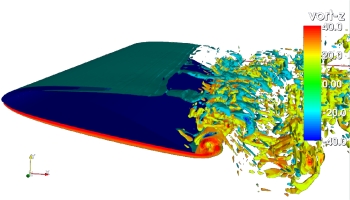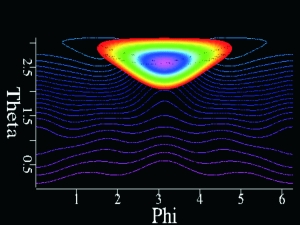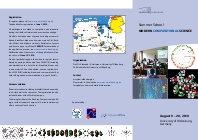Modern Computational Science - Summer School
2nd International Summer School on
MODERN COMPUTATIONAL SCIENCE
August 9-20, 2010, Oldenburg, Germany
Sponsored by:
Downloads of Poster and Flyer:
Overview
The importance of computational methods is steadily increasing in many areas of pure and applied science. Computer simulations and other numerical methods are no longer restricted to "traditional" fields like physics, (quantum) chemistry, or engineering as in the past, but now extend deeply into, e.g., the life sciences, ecology, sociology, or economics. For that reason, Scientific Computing has been dubbed the third pillar of science besides theory and experiment. But despite its growing importance, Scientific Computing is not always adequately reflected in the curricula of many programs at Universities.Therefore, after the great success of last year's School, which brought together students from all over Europe and even overseas, the organisers are pleased to announce the 2nd International Summer School on Modern Computational Science at the University of Oldenburg. This Summer School is intended for advanced undergraduate, graduate, and PhD students of biology, chemistry, computer science, mathematics, physics, and related fields who
- want to gain a solid understanding of some of the fundamental concepts and techniques of Scientific Computing (algorithms, software engineering, numerical analysis, and simulation methods),
- would like to learn about the application of state-of-the-art computational methods to current research problems in pure and applied science, and
- wish to strengthen their knowledge in hands-on computer practicals.
Participants who attended all lectures and tutorials can earn up to 4 ECTS credit points and will be handed out a certicificate at the end of the School.
We would also like to draw your attention to the book
which covers some of the topics that will be dealt with during the first week. Participants will be given a free copy of the book.
Moreover, each participant will receive a volume of Lecture Notes (edited by R. Leidl and A.K. Hartmann).
Topics
The first week of the School will be mainly devoted to Fundamentals. Special topics will be covered in the second week.- Fundamentals: algorithms, software engineering, differential equations, data analysis, Monte Carlo simulations
- Computational Fluid Dynamics: sediment dynamics, wind energy, Navier-Stokes equations, turbulence
- Quantum Chemistry: ab initio and density functional theory, surface photochemistry
- Bioinformatics: phylogenetic trees, sequence alignments, maximum likelihood
- Biodiversity of Ecological Communities: plankton, chaos, stochastic dynamics, neutral theory
Lecturers
External Lecturers:-
Helmut G. Katzgraber,
Computational Physics,
Texas A&M University and ETH Zürich -
Alexandros Stamatakis,
Bioinformatics,
TU München
- Olaf R.P. Bininda-Emonds, Systematics and Evolutionary Biology
- Bernd Blasius, Mathematical Modelling of Biosystems
- Ulrike Feudel, Theoretical Physics/Complex Systems
- Jan Freund, Theoretical Physics/Complex Systems
- Thorsten Klüner, Theoretical Chemistry
- Thomas Kneib, Applied Statistics
- Rainer Koch, Computational Chemistry
- Karsten Lettmann, Physical Oceanography (theory)
- Joachim Peinke, TWiSt - Turbulence, Wind Energy and Stochastics, and ForWind
- Michael Sonnenschein, Environmental Informatics
- Hannes Uecker, Applied Analysis
- Ute Vogel, Environmental Informatics
- Jörg-Olaf Wolff, Physical Oceanography (theory)







